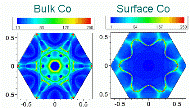Department of Physics and Astronomy: Publications and Other Research

Gordon Gallup Publications
Document Type
Article
Date of this Version
2010
Abstract
We apply a previously developed semiclassical complex time method to the calculation of tunneling ionization of several diatomic molecules and CO2.We investigate the presence or absence of the molecular suppression effect by calculating ionization rates of N2 versus Ar, O2 versus Xe, F2 versus Ar, and CO versus Kr. Comparisons with other theories, including the molecular-orbital-Ammosov-Delone-Krainov (MO-ADK) model and the strong-field approximation, are given. We also analyze the dependence of the ionization rate on the angle θF between the molecular axis and the field direction. The theoretical results agree quite well with experiment for N2 and O2 but give too low a value of the peak angle θF for CO2. Our calculations give small values of the ionization rates for O2 and CO2 at θF = 0 and 90°, in agreement with experiment. Other calculations, including the MO-ADK model and methods involving a numerical integration of the time-dependent Schrodinger equation, exhibit substantially weaker suppression at these angles.


Comments
Published in PHYSICAL REVIEW A 81, 033417 (2010). Copyright ©2010 The American Physical Society. Used by permission.